みなさま こんばんは。桂木嶺です。
新しいブログの移転先をご案内いたします。
まだ、ブログの内容を試験的に書いている段階ですが、
鋭意たのしく作業中です。
アドレスはこちらから。
https://ameblo.jp/takatsuna0303/
今後は、アメブロさんにお世話になることにいたしました。
gooブログさん、ありがとうございました。
ブックマークで登録をされている方は、アドレスの変更をお願いいたします。
こちらのgooブログは残しておきますので、よろしくお願いいたします。
みなさま こんばんは。桂木嶺です。
新しいブログの移転先をご案内いたします。
まだ、ブログの内容を試験的に書いている段階ですが、
鋭意たのしく作業中です。
アドレスはこちらから。
https://ameblo.jp/takatsuna0303/
今後は、アメブロさんにお世話になることにいたしました。
gooブログさん、ありがとうございました。
ブックマークで登録をされている方は、アドレスの変更をお願いいたします。
こちらのgooブログは残しておきますので、よろしくお願いいたします。
きのうはお友達の画家・鈴木素子さんの個展に行ってまいりました。
大変ステキな絵の数々の心癒されました(^_-)-☆
アドレスはこちらから。3月2日まで開催されていますので、
ぜひみなさま、この機会にお越しくださいませ。
http://www.galleryokabe.co.jp/19-2-3info.html
さて、こちらのブログ「新・台所太平記」ですが、
両親や友人たちともいろいろ考え、話し合いまして、
しばらく休止させていただくことにしました。
ブログの移転と、新ブログでは装いも新たにオープンさせようと
考えております。
gooブログさんには大変お世話になりましたが、
いろいろな意味で区切りができたと思いますので、
感謝しております。
新しいブログを立ち上げましたら、
アドレスを改めてご案内いたします。
しばらく休止期間中は、ブログの内容やブログの移転先も含めて
すべて一新させる方向で考えております。
どうぞよろしくお願い申し上げます。
桂木 嶺
きょうは、実は都内某所のホテルにとまって、この記事を書いています。(ストーカー氏がこわかったからなんですけど、とりあえずきょうは無事です^^)
そこで、たのしく小さな海外交流ができました。そこはいわゆるビジネスホテルなのですが、朝ごはんをレストランで食べていたら、たまたま隣の人が外国人の方だったのです。で、様子をみていたら、彼は納豆をパクパク食べているではありませんか!
実はほんとうは「朝ごはんは納豆に海苔にご飯」が大好きと来ている私は、おもわずうれしくなって話しかけてみました。
「ボク?うん、納豆もごはんも大好きさ!実は仕事で2週間ほど日本に滞在するんだ。イギリスからきたんだよ。シンガポールにもこれから行くつもりだけど、きょうは水天宮駅にいこうと思って。ここからの行き方わかる?」
ということなので、わたし、とりあえず、つたない英語でしたが教えてあげました。すると彼は大変喜んでくれ、話がたのしく弾みました。
「へぇ、君、パーヴォ・ヤルヴィのファンで、音楽評論をしてるなんてすごいね!彼はロンドンでも大人気だけど、NHK交響楽団の指揮者をしていたなんてしらなかったよ。きのうの演奏もすばらしかったの?ますます彼は本物だね!えっ、ロンドンにNHK交響楽団が来年くるの?それはぜひいかなくちゃなぁ♪」
私はすっかり嬉しくなりました。ストーカー氏にもある意味感謝しなくちゃなりませんね。彼のおかげで、このイギリス人の彼ともたのしく国際交流ができたわけですから(笑)
あとで、ホテルのエレベータ―の中で、見知らぬ素敵な日本人の男性に話しかけられました。「あなた、あれだけ流暢に英語を話されるなんて素敵だな。ボク、すっかりあなたにあこがれてしまいますよ」
わーい♡ なんだかきょうはモテ運がついてるぞ♪
というわけで、わたしはこれからチェックアウトして、いろいろ都内をお散歩してまいります♪
ではみなさま、よい一日を!
きのうは、NHK交響楽団とパーヴォの最終日。チケットがとれなかったので、いくのを当初あきらめていたのですが、「おけぴ」でなんと、P席1枚(3000円)を売ってらっしゃる方がいるのを発見!さっそく交渉して、チケットをお譲りいただくことができ、無事に最終日、千秋楽に伺うことができました!チケットをお譲りいただいた方、本当に感謝です!
公演自体は、本当にすばらしくて、1日目以上にめざましい進化をとげ、パーヴォとNHK交響楽団のみなさまはさらにグレードアップした見事な演奏を繰り広げました。まさに魂の名演であり、歴史に残る2日間だったといえましょう。前半のプログラムも、非常にメリハリのきいた演奏に、パーヴォがあっというまに立て直し、成功していました。
ストラヴィンスキーの傑作「春の祭典」にいたっては、パーヴォは、旧約聖書の神の怒りを思わせるがごとき、奔騰する熱情をいかんなく発揮。圧倒的なクライマックスを迎えました。最後のパーヴォの放心状態となった瞳には、一瞬の虚無感すらただよい、この曲にかけるパーヴォとN響のみなさんのすさまじい執念と気魄を感じさせてくれて、わたしは大感激しました。おもわず、スタンディングオベーションをしていましたが、みんな気づいてくれてうれしかった!
パーヴォが「春の祭典」のあいだじゅう、やっぱりずっと私をみつめて励ますように、力強く指揮をされていて、わたしは本当にうれしかったです。ほんとうに、どの席にいても、パーヴォは私をみつけて、励ましてくれるのでした。パーヴォが「チコ、数々の人生の試練はつづくだろう。でも、僕が支えて、まもってあげるからがんばって!」と言ってくれているような、そんな熱い思いにとらわれました。
ホールを出た後も、去りがたくて、おもわず楽屋待ちをしてしまいました。この日東京公演最後だった、オーボエの茂木さんが「連日、あなたも通ってくださって大変だったね(^_-)-☆ありがとう!」といってくださり、なんと気遣いのこまやかで優しい方かと感激しました。マロさんもやさしくしてくださり、バスクラリネットの加藤さんともお話でき、ハープの方とも、また第2ヴァイオリンの白井さんとも、クラリネットの松本さんとも、・・・うれしい笑顔が目の前にあり、みなさまの充足し、満足した表情とお話がうかがえたので、本当に幸せでした。
「いつもありがとうね!」と言ってくださるN響のみなさまの優しさ、温かさに、どれだけ感謝してもしたりないくらいです・・!
**********************************
でも、実はきのうはとてもいやなことがありました。映画の「七つの会議」の感想を書いたら、嫌がらせのツイッターのダイレクトメッセージやコメントがきたのです。でも、その文面で、いったいだれがいままで私のストーカー行為をしていたのか、よくわかって・・・。まさに「幽霊の正体見たり枯れ尾花」だったのでした。まさに「七つの会議」を地で行くような、おそろしい展開でした。
ストーカーは、やはり、予想していた通りの人物だったのです!犯人は、東宝社内の人物だと、わたしははっきり認識しました。(こう書けば、東宝社内でこれをお読みの方はすぐにピンとくると思います。ええ、まさに「彼」です)私の同期入社した男性のひとりだと、私は直感的に感じたのでした。
その人物が、私のことをずっと長年にわたって、2ちゃんねるや5ちゃんねる、Twitterなどで、私に関する個人的な情報とデマをながし、私を誹謗中傷し、2ちゃんねるやTwitterなどで、私を攻撃すべくいろいろな人に扇動していたのだろうと私は推察しています。
なぜなら、彼の立場なら、私に関する社内の極秘情報も手に入れられますし、そして、彼は大変なモラルハザードをしてのける人物でもありました。
そして、彼はわたしを「病気」扱いさせるように、東宝社内で孤立させ、退職に追い込むような、大変卑劣なまねをしていたのでした。
その人物の被害者は、わたしだけにとどまらず、実はたくさんの女性がその人物に関する被害を出しているのですが、ことごとくなぜか上層部に握りつぶされ、被害者の女性たちのほうがみな退職を迫られてしまうという異常事態を起こしていました。
両親とNHK交響楽団の方にこの一連の事情をお話しましたところ、もちろんみな大変に驚きました。しかし、「それはしかるべく、警察と弁護士、場合によっては、そのストーカー行為をする人物の会社である東宝にも連絡をいれたほうがいいでしょうね。もちろん、N響としても万難を排しますので」というアドバイスをいただき、とりあえず、きょうは警察と市役所に行くことにしました。
その人物が勤務しており、私の古巣でもある東宝については、もうちょっとその人物に関する証拠が集まったところで、警察のほうからしかるべく動いてもらおうと思っています。東宝社内では、彼に関することは、すべて「握りつぶす」ということをしてきていますので。
彼は、有楽町マリオンに日劇東宝があったときに、営業係をしていましたが、女性アルバイトをあろうことか、劇場の大金庫に監禁し、長時間にわたって不正行為をするという、もう犯罪まがいのことをしていたのです!
しかし、当時の人事は彼を罰せず、被害者の女性アルバイト退職させました。ほんとうなら信じがたい話です。
わたしも彼に関して幾度もセクハラとストーカー行為で訴えました。当時の髙橋専務にも訴えました。が、人事の元役員であるS氏がわたしを診療所の会議室に呼出し、長時間にわたって、わたしを説教し続けました。「あいつのお父様は、東宝にとって大事な功績のあるひとなのだ。(タクシーの運転手の娘である)お前とは【身分】がそもそもちがうんだ!身の程をわきまえろ。それにあいつは単に変わったやつなだけだ。お前たち女の子が自意識過剰なだけだ!」と、大変にひどい対応をし、私をあげくに髙橋専務のストーカーだといいはじめたので、彼に関する被害がどんどん拡大していってしまったのです。
また、彼は、自分のいまいる会社での立場を悪用して、私の個人情報を入手し、エストニアに私が昨年6月に行く直前、私のパソコンをウィルスメールをつかってクラッシュさせ、私のクレジットカードの情報をフィッシングして、身に覚えのない、カードの請求をさせてきて、私を経済的に困窮させるように仕向けていたのでした!!!!(彼の社内での立場は、社員のクレジットカード使用状況も調べ上げることができると、彼はよく私に豪語していました)
彼は大変危険な人物であることにはまちがいなく、私の入社以来、約30年にわたってつけまわし、ストーカー行為をしている人物なのです。私が訴えることでで警察もうごきやすくなろうかと思います。勇気をもって告発することで、私は長年のかなしみとくるしみから解放され、幸せにむかって羽ばたけるように思います。東宝の女性社員たちも、ほっとしてくれるといいなと思っております。
パーヴォがずっと勇気をくれました。彼と出会わなかったら、わたし、ここまで自分の長年の軛と決別できたかどうか!
頑張って生きていこうと思います!パーヴォがくれた勇気に感謝し、人生の試練を乗り越えていきたいと思います!
愛するパーヴォ、おはようございます♪
きのうのストラヴィンスキーは、夢のようだったわ・・・

わたし、ほんとうに、東宝をやめてよかった
 あなたの愛とすばらしい音楽をいっぱいに感じたから
あなたの愛とすばらしい音楽をいっぱいに感じたから




実はね、きのうは、サントリーホールに行く前にTOHOシネマズ日比谷に行って、映画「七つの会議」を見てきたの~ レディースデーだったのですが、オジサマ、オバサマ比率が高かったわ(笑)でも、みんな「シャレにならない」っていってたなぁー。
レディースデーだったのですが、オジサマ、オバサマ比率が高かったわ(笑)でも、みんな「シャレにならない」っていってたなぁー。







 すばらしい傑作なんです
すばらしい傑作なんです

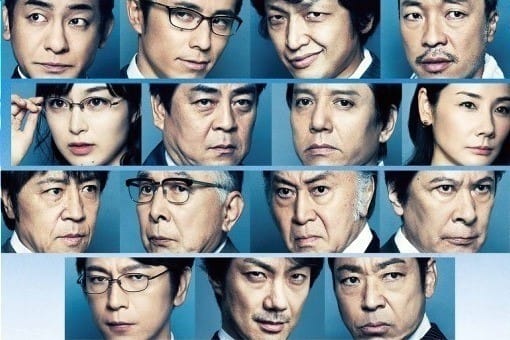
 (笑)大爆笑しちゃいました。
(笑)大爆笑しちゃいました。









 あなたには隠してたけど、実はわたし超~ド近眼で、どびんちゃんメガネっ子だったの。
あなたには隠してたけど、実はわたし超~ド近眼で、どびんちゃんメガネっ子だったの。
 クスクス、ヒソヒソ」とイヤミをたらたら言われたものでした(笑)
クスクス、ヒソヒソ」とイヤミをたらたら言われたものでした(笑)






 出演している役者たちが全員私がテレビ部時代や、宣伝部時代、NHK大河の衣装はもちろんのこと、劇評や社内報で誉めた役者たちばかりだし、いろいろ完成披露試写会などで世話したひとたちばかりだったからです
出演している役者たちが全員私がテレビ部時代や、宣伝部時代、NHK大河の衣装はもちろんのこと、劇評や社内報で誉めた役者たちばかりだし、いろいろ完成披露試写会などで世話したひとたちばかりだったからです

















 いまは、そんなこと全然関係なく、偉い方々は私をかわいがってくださったんだなと思いますが
いまは、そんなこと全然関係なく、偉い方々は私をかわいがってくださったんだなと思いますが

 まだ彼、社内で居座ってるみたいだけど・・マジでひどいっしょー?
まだ彼、社内で居座ってるみたいだけど・・マジでひどいっしょー?


 )、とにかくもうとんでもないパワハラのオンパレード!それはあなたにぜーんぶお話したけど、すごかったですから!!!(笑)一応わたし、女性なんですけど!!!!!もうちょっと紳士に扱えないものかしら!!!といまだにマジでムカつきます(笑)
)、とにかくもうとんでもないパワハラのオンパレード!それはあなたにぜーんぶお話したけど、すごかったですから!!!(笑)一応わたし、女性なんですけど!!!!!もうちょっと紳士に扱えないものかしら!!!といまだにマジでムカつきます(笑)






















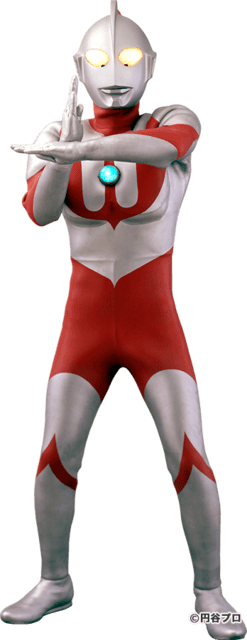
















【Performance Review】 A terrible fierce birth of a soul to "Earth, Space, God, Love, Fate" was born! In the "Festival of Spring" of PAAVO and NHKSO, declare "the first year of the music revolution" around the world!
* I'm sorry, I will revise some revisions from Twitter.
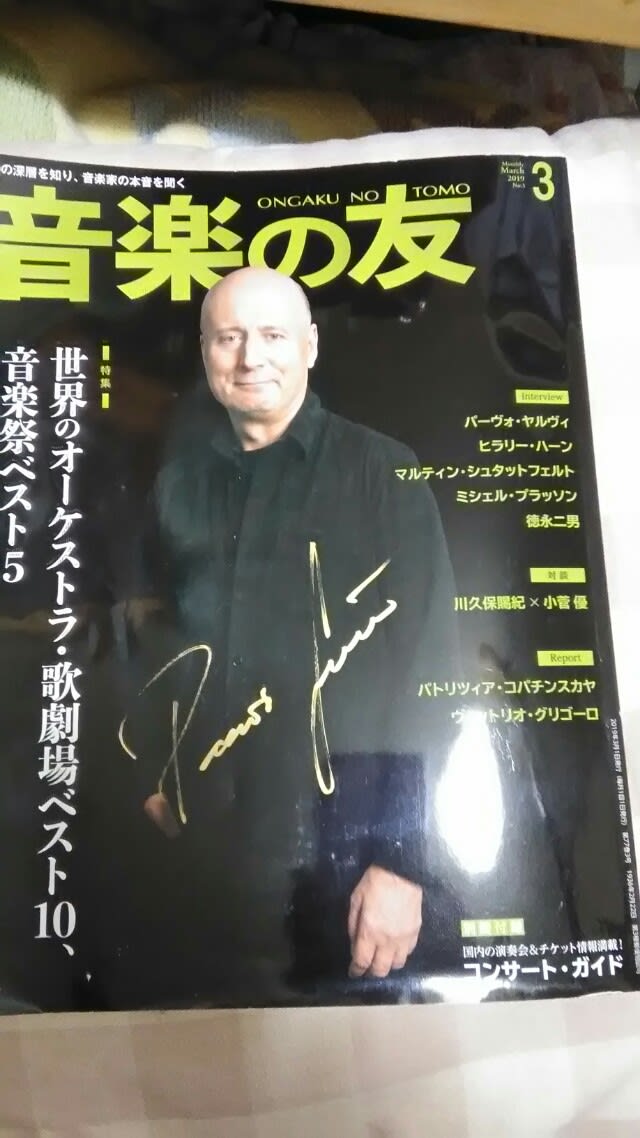
Here is the birth of a soul 's desperation for the tremendously violent' Earth, Space, God, Love, Fate '!
Paavo and NHKSO's "Spring Festival" was the best performance ever, singing out the "first year of the music revolution" to a high degree.
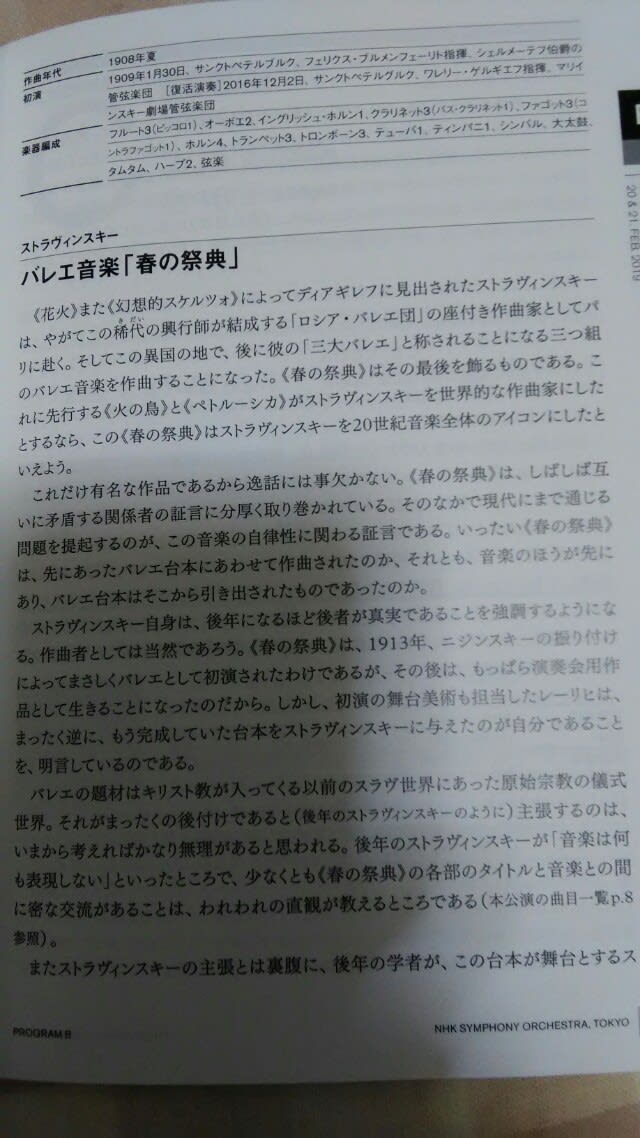
Why do we meet beyond spacetime and resonate with music so far! ? What?
Paavo Järvi held a brilliant victory with Stravinsky, and his backbone, the history of Soviet and Russia, and all life and death combat!
Even though the first half has the goods of Stravinsky, it is somewhat digestive shortage. Somewhat boring parts also disappeared. At the "Russian style Scherzo" finally there is a feeling of PAAVO's demonstration. Somewhat I think that it is necessary for ingenuity. I want the tension to last longer.
But in "Spring celebration", Paavo will converge all the power and storm-like excitement will strike us. The cry of the earth echoes through the Suntory Hall and emotions such that I can not stand up envelop my whole body. I want to devote my life to the "music revolution" that Paavo brings up, I want to follow!
Paavo and NHKSO Evolution can not stop evolving!
Yesterday's "Festival of Spring" is superb and superb among the classical concerts I listened to, and it is exactly a masterpiece in masterpiece.
Earth, life, God, love, destiny. "Fierce love" to all kinds of life forms on the earth which was born in this billions years rises from the whole body of Paavo, and with the appearance like the old warrior and a powerful conduct, we approach the audience of all!
"Chico, will you follow my" musical revolution "?" And Paavo's entertainment with a feeling of intense pressure on Paavo.
If you notice it, it nods at the cry of Paavo 's soul, and the impression similar to dizziness attacks my whole body ....
I saw Paavo 's "death fight", I felt relaxed by his obsession with music, but I wanted to follow hard, I could not stop crying out in my heart!
What a ridiculous "monster = Paavo", I would have loved!
"The hell you have seen in your life up to Toho and now, the world is that I aim of me! I'll forget the whole, not the ideal township far from music! Tremendous and more widely, I areas of God! Prepare to come for the rest of my life, is there Chico? "
I desperately take Paavo's furious magma desperately.
"Make a musical revolution in this world with Chico and I and NHKSO and you!"
Paavo's "voice of the heart" shouts to me like this!
"All I wish to tell you all through this blog! We make a revolution through music! Like Estonia! In the whole world!"
Of course, I searched for Paavo intensely!
"Of course I will follow you in my life! The difficult way is OK!"
In PAAVO 's roar of the hot soul to the whole earth, the impression that the earth trembled shook Tameike- Sannou. I applauded it like a storm and got drunk with the illusion of that music revolution.
Autograph session after the show. There is something to bear in mind, so it is hard to say anything to Paavo. Paavo smiled a small smile, only finally murmuring in English "Your god ... ... the universe ... the earth ... fate ...", Paavo smiled a little and said, "It's fine (even if others do not know)" I stared at me, I cried.
I felt that I was deeply reborn by the power of Paavo so far as a small self. The pleasant pleasure and happiness enveloped my whole body and did not separate it.
The possibility of music was a wonderful overnight which received a hot message by Paavo that it would become a power to change history, no heaven and earth, the destiny of all mankind, no matter what the existence in every universe exists on the earth It was.
Someday I will have a reunion with Paavo, while thinking with PAAVO and NHKSO, the future of classical music, the future of the Earth and the universe ...
(At the Suntory Hall Great Hall on February 20, 2019)


※すみません、Twitterからの再録を一部加筆修正します。
凄まじく激烈な「地球・宇宙・神・愛・運命」への魂の絶唱が、いまここに誕生!
パーヴォとN響の「春の祭典」は、まさに《音楽革命元年》を高らかに歌い上げる、史上最高の名演となった。
なぜ私たちは時空を超えて出会い、ここまで音楽に共鳴しあうのか!?
パーヴォ・ヤルヴィは、ストラヴィンスキーと、そして彼のバックボーンである、ソビエトとロシアの歴史、そして、あらゆる人生と死闘を繰り広げ、輝かしい勝利を収めた!
前半はストラヴィンスキーの佳品が揃うも、やや消化不足か。いささか退屈な部分も散見した。「ロシア風スケルツォ」でようやくパーヴォの本領発揮の感あり。ややここは工夫の必要ありと思う。緊張感がもっと持続してほしい。
しかし「春の祭典」に、パーヴォはすべての力を収斂し、嵐のような興奮が私たちに襲いかかる。大地の叫びがサントリーホールいっぱいにこだまし、立ち上がれないほどの感動が私の全身を包み込む。私は、パーヴォの巻き起こす《音楽革命》に一生身を捧げ、ついていきたい!
パーヴォとN響の進化は止まらない!
昨日の「春の祭典」は、私が聴いたクラシックコンサートの中でもずば抜けて見事、まさに傑作中の傑作である。

地球、人生、神、愛、運命。この数十億年に誕生した、地球上のありとあらゆる生命体への「激烈な愛」が、パーヴォの全身から立ち上り、古武士の如き風貌と強靭な指揮で、我々すべての聴衆に迫り来る!
「チコ、キミは僕の《音楽革命》についてきてくれるか?!」とパーヴォに激しく迫られたような気魄にみちた、パーヴォの熱演。気が付けばパーヴォの魂の叫びに頷き、眩暈にも似た感動が私の全身を襲う…。
パーヴォの《死闘》を目の当たりにし、彼のすさまじい音楽への執念にたじろぐ私だったが、懸命についていきたいと、心の中で叫ばずにはいられなかった!
なんてとんでもない《怪物=パーヴォ》を、私は愛してしまったのだろう!
「君が東宝や今までの人生で見てきた地獄は、僕が全部忘れさせてやる!僕の目指す世界は、音楽の理想郷どころではない!もっと広くてすさまじい、神の領域なんだ!一生一緒について来てくれる覚悟は、チコにはあるのか?!」
パーヴォの激烈なマグマを必死で受け止める私である。
「いいかチコ!僕と君とN響で、この世に音楽革命を起こすんだよ!」
と、パーヴォの「心の声」はわたしにこう叫ぶ!
「いいか!僕が君に語る思いを、すべて君はこのブログを通して伝えるんだ!僕たちは、音楽をとおして革命を起こすんだ!エストニアのように!全世界に!」
私はもちろん、激しくパーヴォを求めた!
「もちろんよ!あなたに一生ついていきます!茨の道でも構いません!」
パーヴォの、全地球への熱い魂の咆哮に、大地が震えるほどの感動が、溜池山王に押し寄せた。嵐のような拍手と、その音楽革命の幻影に酔いしれた。
終演後のサイン会。万感込みあげるものがあり、うまくパーヴォに何もいえない。英語でようやく「あなたの神・・・宇宙・・・地球・・運命・・」とつぶやいただけで、パーヴォは小さく微笑み、「いいんだよ(ほかの人がわからなくても)」優しく私を見つめてくれて、私は涙した・・・。
いままでのちっぽけな自分が、パーヴォの力によって、大きく生まれ変わったのを私は感じていた。めくるめくような快感と幸せが、私の全身を包み込んで離さなかった。音楽がもつ可能性は、歴史を、いや天地を、全人類の運命を、いや地球上、あらゆる宇宙に存在するものすべてを変える力になる、とパーヴォの熱いメッセージを受け取った、素晴らしい一夜となった。
パーヴォとの再会をいつか心に秘めながら、パーヴォとN響、クラシック音楽の未来、地球と宇宙の未来に想いを馳せたのであった…。
(了・2019年2月20日、サントリーホール大ホールにて)

For the author who knows Adachi Mari truly personally, it was the result of this time "B → C Bach to Contemporary from Adachi Mari Viola Concert" which is very unexpected feeling.
Adachi 's truth of the real face is a very refreshing and cheerful, refreshing person.
In August last year, her real face and performance at the Pärnu Music Festival in Estonia made the impression even more pleasing.
However, once on the stage, from the performance, a dark emotion, an indescribable passion, and a worldview with introspectional character often revealed, reviving with her vivid individuality.
Their appearance remarkably appears in the first two songs of Pelio (1925-2003)"Sequenza IV".
While occasionally cutting the strings in a lively performance, using the transcendental technique without difficulty, this extraordinary large instrument presents various possibilities of Viola.
Furthermore, searching for the spread of music is the masterpiece"prism spectra (2009)"by the 3rd song contemporary musician Dai Fujikura. (1977 ~).
Adachi is attempting to reproduce the phrase for a modern chaotic society by fusing Viola and electronics (Kazuya Miyashita) here.
In a sense, in a bustle that resembles noise in a sense, it is often played furiously as a dissonance.
However, as the sparkling fireworks come to light, the end of the story abounds abruptly.
Although it is a very experimental work, I would like to mention it as a joyful article that captures such passion as Adachi secretly hides it.
After breaks, the hardships and epic works continue.
The fact that I made the best use of Adachi's individuality is actually"Fratores (1973/2003)"ofEstonian's master, Alfa Pelt (from 1935).
It is a masterpiece that makes you feel the soft light and the color of the sun as though it reminds me of the calm ocean of Pärnu Estonia.
It is highly introspective, and matching with the piano (Shota Nakano) will be remembered as a very splendid performance.
Currently, Estonia is attracting attention as a musical music state, but people have lived in a fair and flexible manner in the suppressed situation under the tyranny of the former Soviet Union.
Admired passion in it, boldly at the same time, boldly, Adachi's viola and Nakano's piano have drawn out and succeeded successfully.
The masterpieces were thefour music fromthe"Ruja ritual" Tazuni Tazuni "ofthe new, Bando(1991 ~), which was admittedby Adachi herself, became world premiere, and was played last.
It is a work with a very ambitious motif and let us hypothesize to the music of the ritual of the Ruja tribe, but with the premonition of the collapse of the world order and the diversity of religious perspectives of the 21st century society, the limit of the economy in the capitalist society, Buddha's devastation of people, and hope for the future entrusted to the end, Bando is a masterpiece making Bando's personality whilst not excessively deficient.
Especially, the director that Adachi of the beginning appeared disturbed with the hair is quite dramatic as if it represents a frenzy in front of the group of the "Sumidagawa" of Kabuki dance, various warfare, raging contemporary society Among them, it is brilliantly depicting the sadness and painful anger of men whose names have also been devastated.
I would like to look forward to including future collaboration with Adachi and Bando as a memorable big piece that extended the possibility of modern music one more.
After the show, I was able to convey the excitement of this evening to Mr. Shinichiro Ikebe, the representative composer of Japan who longing for a long time since my school days, and I was deeply moved.
I was touched by Mr. Ikebe, who is a warm and truly fascinating person, and I listened to my poor impressions, and encouraged warm encouragement to walk the way to music criticism, it was a memorable night.
The night of Hatsudai was illuminated beautifully in the full moon of the spring, as if to bless the future of the young talent of the classical music world.
(at the Tokyo Opera City recital hall on February 19, 2019)
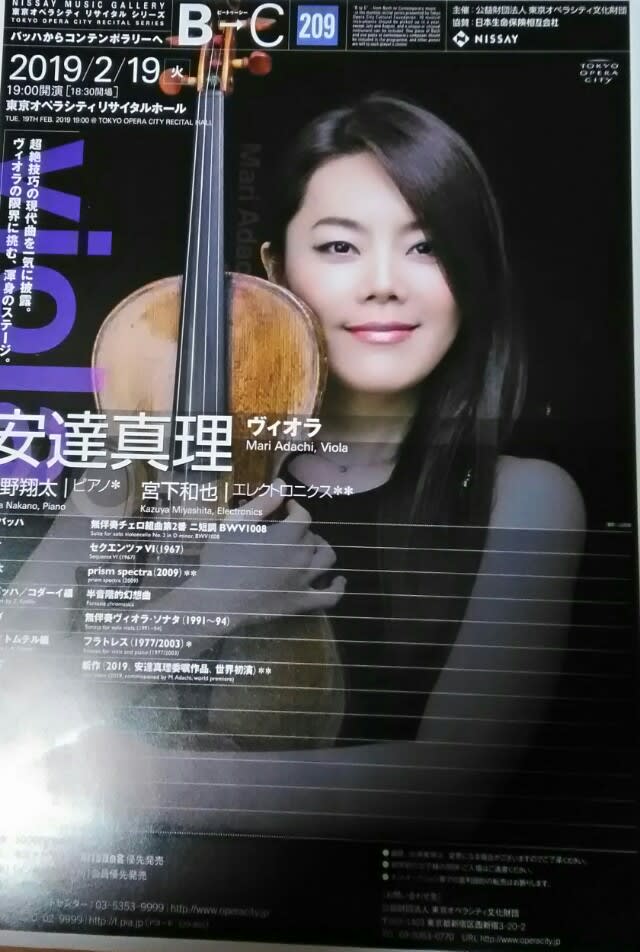

安達真理を個人的に知る筆者にとっては、非常に望外の想いのする、今回の「B→C バッハからコンテンポラリーへ 安達真理ヴィオラコンサート」の成果であった。素顔の安達真理は、非常に明朗快活で屈託なく、さわやかな人物である。昨年8月、エストニアのパルヌ音楽祭でふれた彼女の素顔と演奏は、その印象をいっそうつよくしたものである。
しかし、ひとたび舞台にたつと、その演奏からは、仄暗い情念と、抑えきれない激情、そして、しばし内省的な性格をおびた世界観が現出し、彼女の鮮烈な個性となって蘇る。
その個性が顕著に現れるのが、前半2曲目のペリオ(1925年~2003年)作曲「セクエンツァⅣ」である。はげしい演奏に弦をときおり切らせつつも、超絶技巧を難なく駆使して、このおそるべき大器はヴィオラのもつさまざまな可能性を提示してみせる。
さらに、音楽の広がりを模索するのが、3曲目の現代音楽家・藤倉大(1977年~)による大作「prism spectra(2009)」である。安達はここでヴィオラとエレクトロニクス(宮下和也)の融合による、現代の混沌とした社会への、警句の再現を試みている。それはある意味騒音にも似た喧騒の中で、しばし激烈に不協和音ともいうべき中で奏でられる。が、やがて線香花火がちりゆくように、唐突に物語の終焉を迎えるのである。非常に実験的な作品ではあるが、安達がひそかに忍ばせる、のたうち回るような情念をとらえた佳品として、記しておきたい。
休憩後は力作、大作がつづく。安達の個性をもっともよく生かしていたのは、実はエストニアが生んだ巨匠、アルフォ・ペルト(1935年~)の「フラトレス(1973/2003)」である。エストニアのパルヌのおだやかな海を思わせるがごとき、柔らかな光と太陽の色を感じさせる名演である。非常に内省的であり、ピアノ(中野翔太)とのマッチングもきわめて流麗な演奏として記憶に残るものとなろう。エストニアは現在でこそ、おだやかな音楽国家として注目を集めるが、旧ソ連の圧政下における抑圧された情勢の中で、ひとびとは逞しくしなやかに生きてきた。その内にひめた情熱を、つつましくも時に大胆に、安達のヴィオラと、中野のピアノが見事に描き出し、成功している。
圧巻だったのは、安達自身が委嘱、世界初演となり、最後に演奏された、新鋭・坂東祐大(1991年~)の「ルジャ族の儀礼 ”タズニ・タズニ”より4つの音楽」である。きわめて野心的なモティーフをもつ作品であり、ルジャ族の儀礼の音楽に仮託させつつ、世界秩序の崩壊の予感と、21世紀社会がもつ、宗教観の多様性、資本主義社会における経済の限界、人々の精神の荒廃、そして最後に託された未来への希望を、坂東が過不足なく、安達の個性もいかしつつ作り上げている傑作である。
特に、冒頭の安達が髪を振り乱して登場する演出は、歌舞伎舞踊の「隅田川」の班女の前の狂乱を表しているかのごとく、きわめて演劇的であり、さまざまな戦禍、苛烈な現代社会の中で、精神を狂わされた名もなき人々のかなしみと痛切な怒りを描出して見事である。現代音楽の可能性をまたひとつ広げた、記念すべき大作として、今後の安達と坂東のコラボレーションも含めて楽しみにしたい。
終演後、長年学生時代から憧れの存在であった、日本を代表する作曲家・池辺晋一郎氏に、この夜の興奮を伝えることができ、感激もひとしおであった。温厚篤実な池辺氏の素顔にも触れられ、また、私のつたない感想も聴いていただき、音楽評論への道を歩むことも温かく励ましていただいた、まさに思い出に残る一夜となった。
初台の夜は、春の満月の中、美しく照らし出され、クラシック音楽界の若き才能の未来を祝福するかのように暮れていったのである。
(了・2019年2月19日、 東京オペラシティ リサイタルホールにて)
バンザーイ



希望していた仕事の書類選考、通りました

来週火曜日に面接です

「超マジでヤバい」です










嬉しくて涙が出そうです


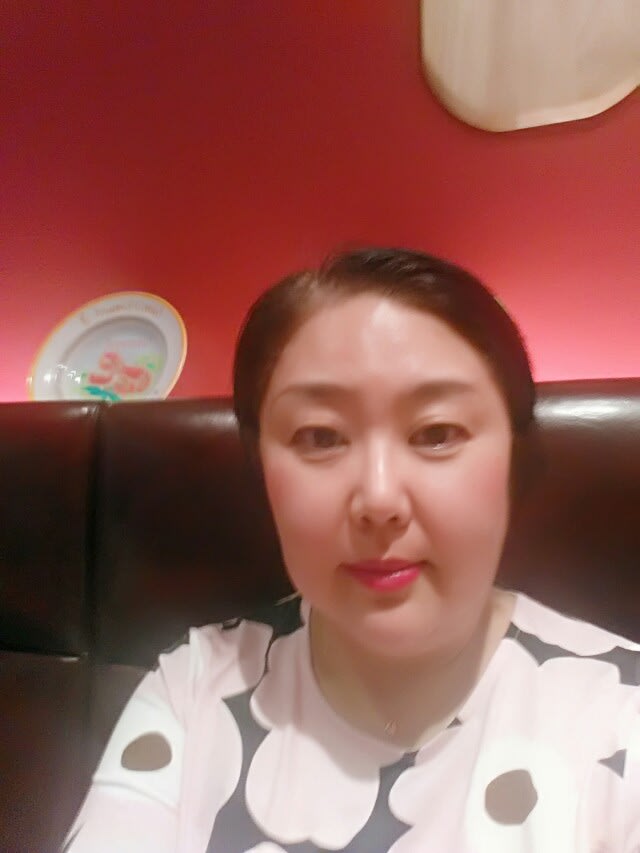
いま、安達真理さんのコンサートに来るべく、
ワクワクしながら初台のオペラシティで待ってます
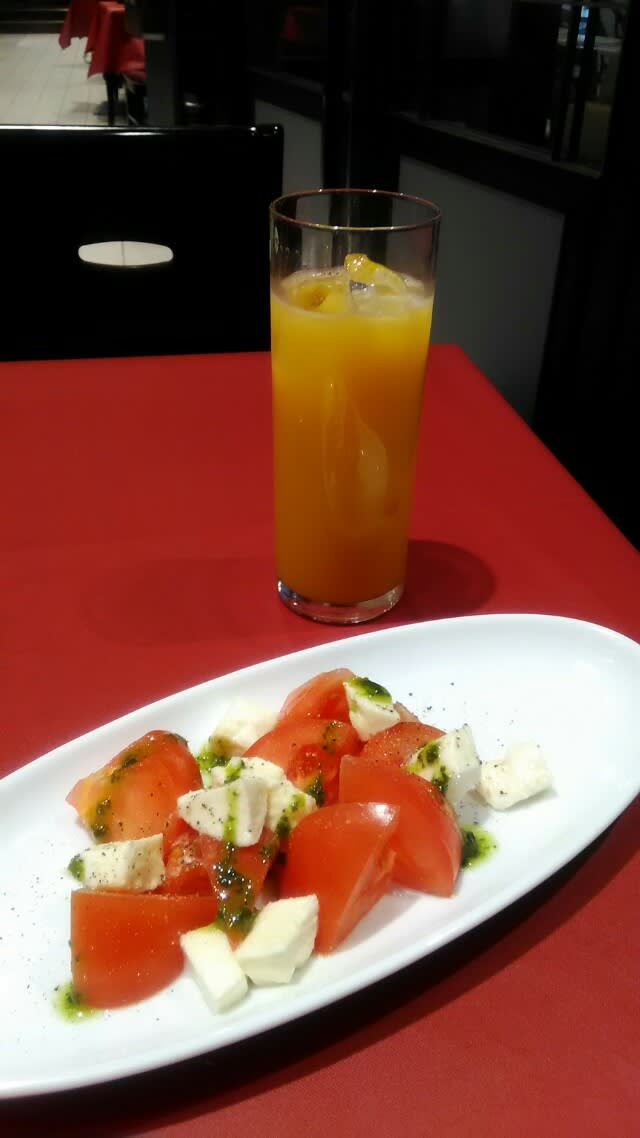
うれしいなぁ♪
超マジでシアワセです♪
パーヴォ、応援してくださったみなさま、ありがとう♪
ただいま、パーヴォとパリ管の、ブラームス交響曲第1番をみながら、
家計簿をつけてまーす


https://www.youtube.com/watch?v=BRdEgS_OHAk
あーしあわせ



でも、このころのパーヴォ(パリ管がいけないというわけじゃないけど)、
実はそんなにわたし、ときめきません(笑)
なぜだろうか・・・。
うーん、やっぱりNHK交響楽団の首席指揮者になられてから、
がぜんパーヴォは「大化け」したような気がするなぁ・・。
正確に言うと、2017年6月30日の「ザ・グレート」(シューベルトの)から
大化けしまくったというか、つまり私と出会った日なんだけど・・。
というのは、私の贔屓目にすぎるかなぁ?
ともあれ、いつかNHK交響楽団ともブラームス交響曲第1番を
ぜひ演奏していただきたいわ








なんでも、最近はこうしてリクエストをだしてみることにしました(^_-)-☆
だって、パーヴォ、絶対実現してくださいますもの

うれしいな



愛するパーヴォ、みなさま、おはようございます!
きょうは、思い切って、JK(女子高生)風にかいてみますね(^_-)-☆
きのうTwitterで知ったのだけど、パーヴォとNHK交響楽団のみなさまが、こんど来年の2月にロンドン公演をすることをしりました!
きゃーっ、マジでうれしい~


しかも、わたしがずっとあなたにリクエストしていた、
ラフマニノフ交響曲第2番なんだもの!
夢みたいに嬉しいわ♡
あの素敵な第3楽章をきいたら、
またわたし、あなたの腕の中で悶絶してしまいそう

またまたエクスタシーを感じてしまいそうだわ


パーヴォ、あなたはどこまで素敵なひとなの!
NHK交響楽団の、アンドレ・プレヴィンが指揮した
この曲のYouTubeをききながら、すっかり夢見心地です。
(茂木さんたちが若い若い!(笑))
アンドレ・プレヴィンですら、こんなにすてきなのだから、
あなたが指揮したら、ロンドン中が熱狂するに決まっているわ



https://www.youtube.com/watch?v=JVcAqmyMyfU
もちろん、これはサントリーホールでもやるけど、
ロンドンでやるってところが、
あなたのロマンティックな性格を表していてすばらしいわ


ロンドンっ子たちもあなたとNHK交響楽団に夢中になるでしょうね!
私、ロンドンって一回だけ行きましたけど、
それも30年以上も前のことだから、
実はよくおぼえてないの
そのとき、大英博物館を高校の短期留学で、
集団で見学した思い出があるくらいね。
当時の晃華学園の高校のシスター(修道女)の先生に、
「どんなにあなたたちがお化粧しても、
髪の毛をくるくるドライヤーで巻いても、
最後はこうなるのよ」
って、よりによって、<エジプトの少女のミイラ>を見せられたの!

おまけに、いきたくもないのに、あのぞっとする
「<ロンドン塔>を見ろ!」って言われたの

「(断頭台に消えたスコットランドの女王である)メアリー・スチュワートの生涯に思いをはせましょう!」
っていうのよ!いったいどういうつもり?
いくらお堅いカトリックの女子校でも、はっきりいって、趣味がサイアクな学校よ、晃華学園って!(笑)
ねぇ~パーヴォ、ふつう、ロンドンっていったら、ビッグベンとウェストミンスター寺院とバッキンガム宮殿とウエストエンドを見るよね?
でもそういうこと、絶対晃華学園ってさせないの!
どこまでも、「カトリック」を守ろうとするの!(スコットランドもバリバリカトリックですからね💦)絶対に「英国国教会」は認めないの!
だから、短期留学先はイギリスのチェルトナムだったんだけど、そこの街もがちがちのカトリックだったし(笑)
だから、日本聖公会がつくった(英国国教会の流れをくむ)立教大学に進んだ私がいかに晃華学園の中で落ちこぼれか、おわかりいただけたでしょう?(笑)上智大学と上智短大と白百合短大に行けた人が、いちばんのエリートなの、晃華学園の中では!(大爆笑!)
だって、立教大学に推薦入学がきまったとき、あるシスターがこういたずらっぽくいったのよ。
「チコ、あなたはとっても変わっているからね(^_-)-☆だから立教なのよ」ですって!
パーヴォ、初めてあったとき、あなたはわたしを「キミはちっとも変わってないよ!」と言ってくださってとてもうれしかったけど、小さいころから「かわってる、かわってる」ってシスターたちに言われて、すごく悩んでたのよ。
でも、無理もなかった!だって、カトリックの考え方と私の考え方って全然ちがうんだもん!!!
とびきり素敵なひとで、好きな男性が現れたら、そりゃどんなことしてでも、一緒になりたいにキマッてるでしょう!
「風と共に去りぬ」のスカーレットだって、イイ男と一緒に暮らすためには頑張って人生を生きてしまうでしょう!そこがすばらしいんだけど



ま、それはさておき♪
だから、来年は絶対それまでに就職して、お金をためて、
ロンドン旅行のリベンジをしたいな

 (日本語でリベンジとは、「やり返す」「イメージをよくする」「できなかったことをもう一度チャレンジする」という意味があります)
(日本語でリベンジとは、「やり返す」「イメージをよくする」「できなかったことをもう一度チャレンジする」という意味があります)
あ、なんだかあなたにたのしくいろいろおしゃべりしていたら、
とっても元気がでてきたわ(^^)/
これから、家計簿がたまっているので、それをつけて、履歴書を書いて、
プリントアウトして、郵便局にそれを出して送って、それから、安達真理さんの
コンサートにいきますね。
あなたは来られるのかな?
もしいらしゃったらうれしいな


ところで、明日のコンサート、あなたは、いつもの対向配置をされないそうですね。
どんな感じになるのかな?
いまからとってもワクワクしているね!
がんばってくださいね!\(^o^)/
あいしてるね


ちゅ♪ちゅ♪ちゅ♪
あなただけのチコより

ロンドン在住の音楽ライター・後藤菜穂子さんのツイッター情報です!(情報感謝です!)
来年2月、なぜか東京でのパーヴォの公演が2回しかないので、ふしぎに思っていたのですが、理由がわかりました!
来年2020年2月24日(月・祝日 来年からは23日が新・天皇誕生日になりますので、その振り替え休日になります!!!)、ロンドンのフェスティバルホールにて、
パーヴォ&NHK交響楽団のみなさまが、
堂々のロンドン公演を行うことが
わかりました!

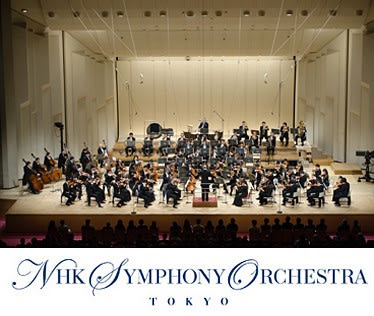
詳しくはこちらのサイトから。日本語訳も一部対応できているようです。
https://www.southbankcentre.co.uk/whats-on/123941-paavo-jarvi-nhk-symphony-orchestra-2020
〇2020年2月24日(月・祝) よる19時30分から
ロンドン・ロイヤルフェスティバルホールにて
〇武満 徹「How Slow the wind」
〇シューマン 「チェロ協奏曲」
〇ラフマニノフ 「交響曲第2番」
の以上です。
※チェロは女性ソリストで、Sol Gabetta さんというアルゼンチン出身のチェリストの方です。
やったー!ついにパーヴォとNHK交響楽団、ロンドンに凱旋公演!\(^o^)/
2017年のヨーロッパツアーのときは、まだパーヴォと出会う前でしたからうかがえなかったのですが、これはなんとしても伺いたいとおもっています!
でもお小遣いもためなくちゃならないし、就職も絶対にしたいですね!!!!
なにがなんでもがんばります!
ということは、
・・・ねぇ、パーヴォ?来年もう無理に毎月NHK交響楽団に行く必要はないかしら?
あなたの公演だけ聴きに行けばいいかな?(いえいえ、定期会員としては、もちろんN響はききますよ♪ でも席替えはしたいと思っていますけどね!)
いま、2020年までのスケジュールが今月の「フィルハーモニー」(N響のプログラムですね)にでてるんですが、2020年の2月5日(水)・6日(木)にサントリーホールのBプログラムで、パーヴォとNHK交響楽団のみなさんによる、ラフマニノフの交響曲第2番の演奏があるので、ロンドンに行かれないという方は、そこで聴いていただくといいかと思います。
☆ちなみに、ラフマニノフの交響曲第2番ってこんな曲です。ご参考までに。
大変ロマンティックな曲で、すばらしい傑作です!特に第3楽章が有名ですね!
https://www.youtube.com/watch?v=b_Nm7Gduvho
※パーヴォも一度、シンシナティ交響楽団とCDを出されています!こちらで予習されるのもオススメ。第3楽章の甘やかな美しさ、やさしさあふれる名演は、パーヴォの独壇場です。
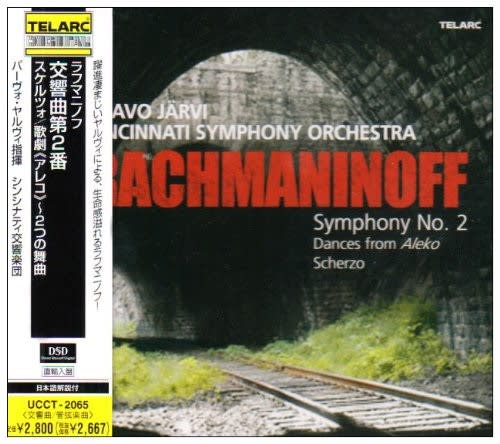
実は、この曲(パーヴォ指揮の)の想い出が強烈にありまして・・・。
パーヴォと出会ってからというもの、前の夫と離婚するかどうか、すごく悩んだ時期がありました。前の夫を朝会社に送りだしてから、ふと手にしたのが、たまたま買ったこのCDでした。そして、なにげなくCDを聴いて、第3楽章の、パーヴォの、なんともいえず優しい指揮と音色を聴いたら、滂沱の涙であふれてとまらなくなってしまって・・・。
このCDを聴いて、パーヴォへのつきせぬ愛があふれてとまらなくなりました。そして、毎朝、ずっとひとりでこれを聴いていました。そして、その尽きせぬ想いを、毎朝パーヴォにメールでしたためました。
そして、2017年12月25日。パーヴォが「浄められた夜」をわたしにプレゼントしてくださり、彼に一生ついていこうと決めたのでした。
パーヴォは何もお返事はいわなかったけれど、このロンドン公演で演奏される、ラフマニノフ交響曲第2番が、そのお返事なのだなとうけとめています。
先日のラフマニノフピアノ協奏曲第2番と合わせて、パーヴォの優しさと愛情いっぱいの想いを感じて、幸せすぎて泣いているかつらぎです・・。
一応、これがラフマニノフ交響曲第2番の第3楽章です!
https://www.youtube.com/watch?v=JVcAqmyMyfU
※ロイヤルフェスティバルホールは、ちなみにこういう会場です!
https://www.southbankcentre.co.uk/venues/royal-festival-hall
https://london.navi.com/play/4/
ツアー等があるのかどうかは、こんど20日にサントリーホールにうかがいますので、そこで詳しいことうかがってこようと思います。
ただ個人で行くとなると、大体、相場が最低で18万円弱から29万円前後ということなりそうです。(東京・羽田発 日本航空を使っていった場合ツアー料金です)
http://www.hankyu-travel.com/tour/detail_i.php?p_course_id=E811JH2&p_hei=10&p_baitai=912
がんばって就職して、お小遣いをためて、ロンドンで幸せになりますね!(^^)/
ちょっと大変ですけれど、
お小遣いをためて、
みんなでパーヴォとNHK交響楽団を
応援いたしましょう!(^^)/
きのう、お友達といろいろショッピングして、たのしくおしゃべりをしたのですが、いろいろ今後のことを相談したりしました。
お友達は、とっても真剣にいろいろ相談にのってくれてうれしかった~



今後のこと、こうしようと思います!
1)音楽評論家はやめる。クラシック音楽鑑賞は趣味として、割り切る。聴くのもNHK交響楽団だけにする。定期会員も、A・Cプログラムの初日だけにして、Bプログラムはパーヴォだけ聴く。
※というのも、やっぱり音楽評論って全然収入にならなくて、とても持ち出しが多いからなんです。うちが裕福ならいいけれど、やっぱりそこは庶民の家庭なので、無理はしたくないなと思いました。それに、先日パーヴォのラフマニノフとプロコフィエフを聴いて、すごく感動したのですけれど、わたしはやっぱり「パーヴォとNHK交響楽団」が好きなので、客観性という意味では、絶対に無理みたい。逆にたのしくミーハー精神でパーヴォを応援したほうが、気がラクかもしれないね、とお友達とも話しました。
他のオーケストラや指揮者さんは正直・・実はどうでもいいところがあります。でもそういう気持ちってごまかせないし、演者の方にも失礼があるといけないし、余計なトラブルのもとになるので、今後はパーヴォとN響だけにして、聴くことにしました。
2)パーヴォのコンサートがおわったら、就職活動に邁進し、がんばる!
※おかげさまで、ハローワークでいいお仕事がまた紹介していただけたので、がんばります!生活保護なんて、受けてる場合じゃなかったですね(笑)
どんどん時間があったら、就職活動に邁進する!前進あるのみ!でがんばります!あとは独立のための家探しですね!これにがんばります!
3)サイン会は、極力いかない。よっぽど感動したら行くけれど、あとはもうさっさと帰宅して、遅くならないようにして、疲れをためないようにする。
※うん、それでもパーヴォのサイン会ってやっぱり彼に、すばらしい演奏のお礼と感動を伝えたくて行きたくなるんですけど、CDがどうしてもN響だけに限られますでしょ?もうちょっとドイツカンマーフィルブレ―メンのCDもサインしてもらえるようにしてほしいけど・・・。
それに、なんだかサイン会のメンバーも固定化していて、「えっ、またあの人きてるの💦」とおもうこともしばしばですね。わたしのことを目の敵にしている熱狂的なパーヴォファンのオバサン(っていったら失礼ですけど、ひとりすごくコワいオバサンがいるんですね)とかもいて、露骨ににらんできたり、時には文句を言ってくることもあり(!)、正直ちょっとコワいなぁ・・というのがホンネですね。彼女がひょっとしてストーカーだったのかしら?と思うこともしばしばです。
ねぇ、パーヴォファンのみなさんは正直、サイン会の運営の仕方、どう思われているんでしょう・・?今のままでいいと思います、ほんとに?もうちょっと考えるべき時期にきてると思うけど・・・。
パーヴォとお話できるのはうれしいけど、そういう嫌がらせめいたことで、よけいな神経はあんまり使いたくないし、せっかくの音楽の余韻が楽しめなくなるので、サイン会はなるべく行かない、ということにしようと思っています。
ま、今度のサントリーホールは行きますけど、同じような状態だったら、もう当分はいかない、と決めましたですね。わたし、割り切るとけっこう割り切りは早いんです(笑)。
もうパーヴォの、私をどう思ってくださっているか、この2月の公演で、十分気持ちはわかりましたし、ここは彼を信じてがんばればいいのだなと思うことにします(^_-)-☆
というわけで、明後日のサントリーホールをとってもたのしみにしています!
パーヴォ、N響のみなさま、がんばってくださいね!\(^o^)/
きのうは、臨時収入がはいりまして(きゃ♡)、うれしくなって、お友達といっしょに、表参道と原宿にいってきました







ひっさしぶりのたのしいショッピング、とことん楽しみました~(^^)/
まずは表参道ヒルズ前で集合~(^^)

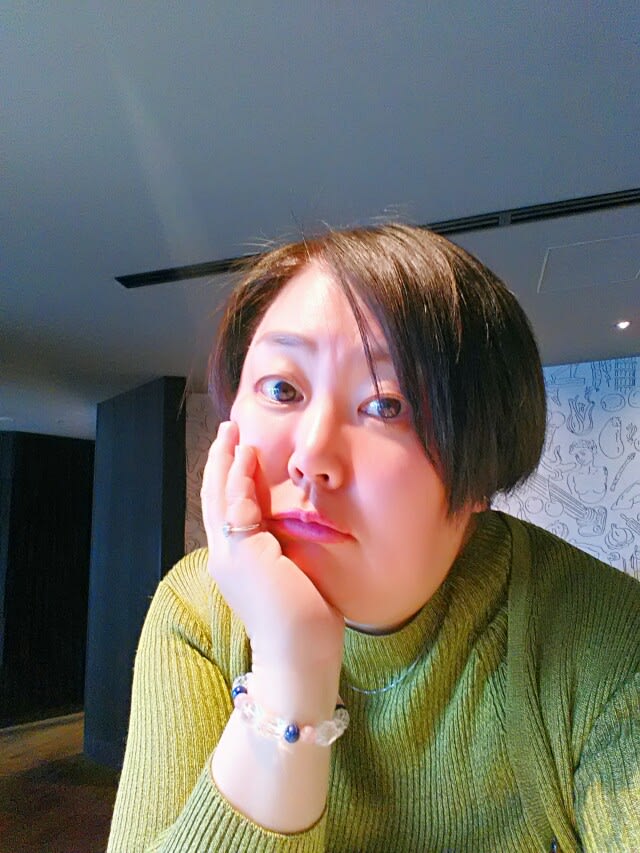
きょうは最初は母から借りたこちらのモスグリーンのセーターとカーディガンを着ていったのですが・・・(笑)
最初に、ウィンドウショッピングということで、表参道ヒルズ1階の「ヴァレンティノ」をのぞき見
 人生初の「ヴァレンティノ」体験
人生初の「ヴァレンティノ」体験




なんとこちらのハートのバッグが、37万円!!!!!!! マジですか~!!!
(エストニアとベルリンと両方いけてしまうわ
 )
)

こちらのシューズが、8万円台後半・・・おもわずため息


こちらは限定400個の赤いバッグです。シリアルナンバー付きで、40万円以上するのだそうです!!!
いったい誰が買うんでしょう?!ビックリです!!!
いきなりの衝撃でしたが、パーヴォの「メタモルフォーゼン」を聴いて、ちょっと心を整えて


 (この曲、とっても心が癒されて、美しい気持ちになれるので、大好きなんです
(この曲、とっても心が癒されて、美しい気持ちになれるので、大好きなんです



 )
)
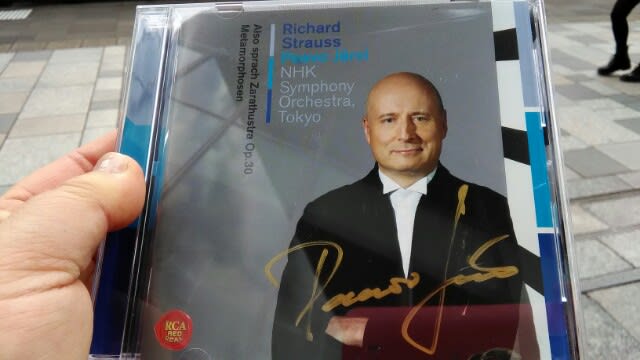
表参道で、パスタランチ(1900円税込み。ちょっと贅沢しちゃいました♡)をいただき、大変満足。牛肉のカルパッチョがとにかく美味です!

こちらはアマトリチャーナ。トマトベースの味が大変品がよくおいしく楽しめます

食後はパンナコッタとカプチーノ。これで1900円だと、ある意味オトクかも♡

近くの化粧品屋さんで、ルージュの色を試しに塗ってもらいました。春色のサーモンピンクをさがしていたのですが、似合うかな?









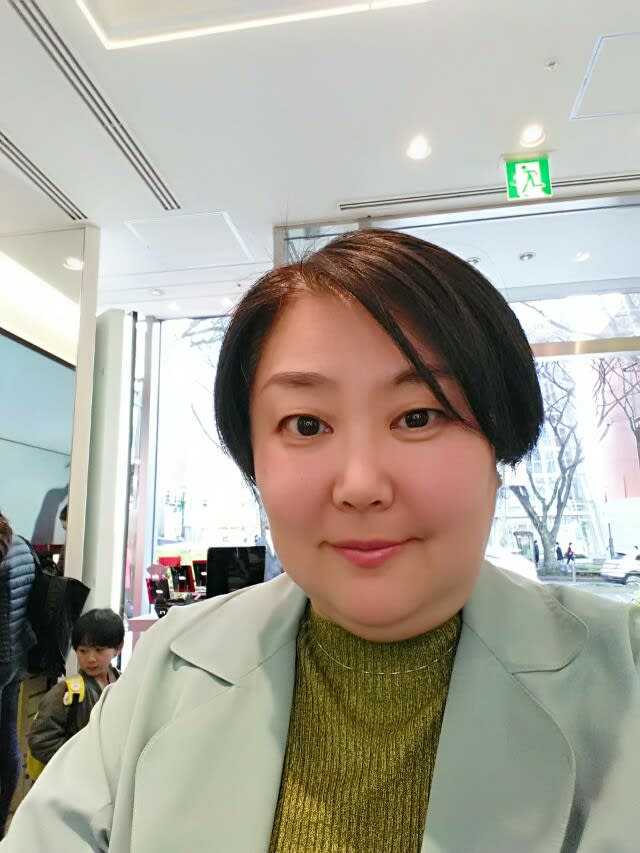
さて、お友達と散策がてら、原宿方面へ向かいます。
着いたのは、なんとマリメッコ



こちらのリュックサックがオトクなお値段でしたが、なんと「エストニア製」






 もちろんゲットしました(^_-)-☆ 20日にサントリーホールに行くので、パーヴォのコンサートに持っていこうと思います~
もちろんゲットしました(^_-)-☆ 20日にサントリーホールに行くので、パーヴォのコンサートに持っていこうと思います~
 パーヴォ、喜んでくださるかな
パーヴォ、喜んでくださるかな





ワンピースもお揃いであったので、こちらも購入





 春物の準備もちゃくちゃくと
春物の準備もちゃくちゃくと

原宿方面をいくと、スプリングコートも見つけることができました 春らしい淡いベージュの、品のいいコートだったので、こちらも試着して購入
春らしい淡いベージュの、品のいいコートだったので、こちらも試着して購入



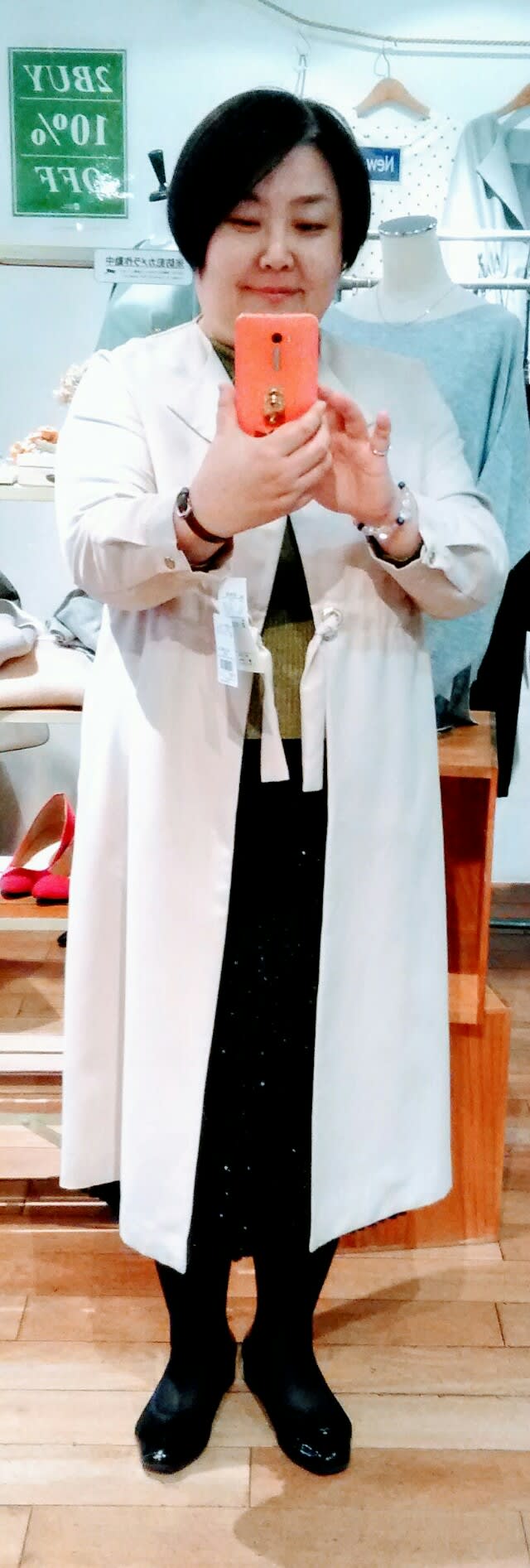
ちょっとここでひと休憩。春水堂さんという、タピオカミルクティーの発祥のお店で、ごらんのタピオカミルクティーをいただき、夢見ごこち



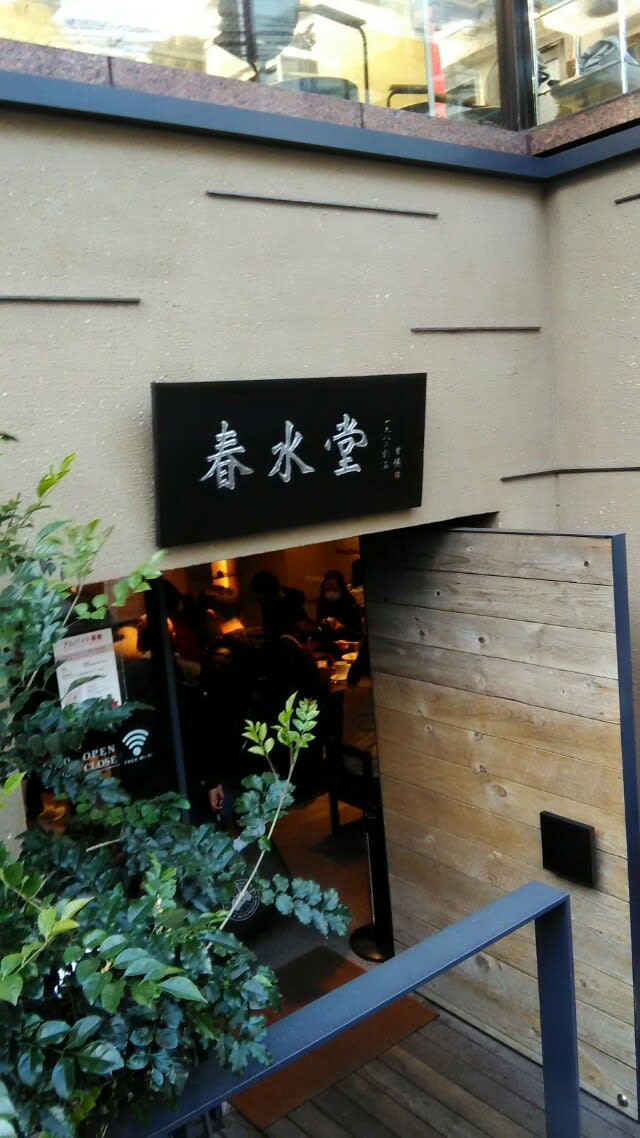

そのあと、いくつかショップを回って、20日のサントリーホールに着ていく服と靴をコーディネート。ベージュと黒のトーンで統一してみましたが、どうでしょう?なかなか品よくなったかな










アクセサリーもオトクなお値段でゲットでき、大変満足です




帰りはこちらのお店で、かるく一杯♪ クラシックモヒートをいただき、帰途につきました

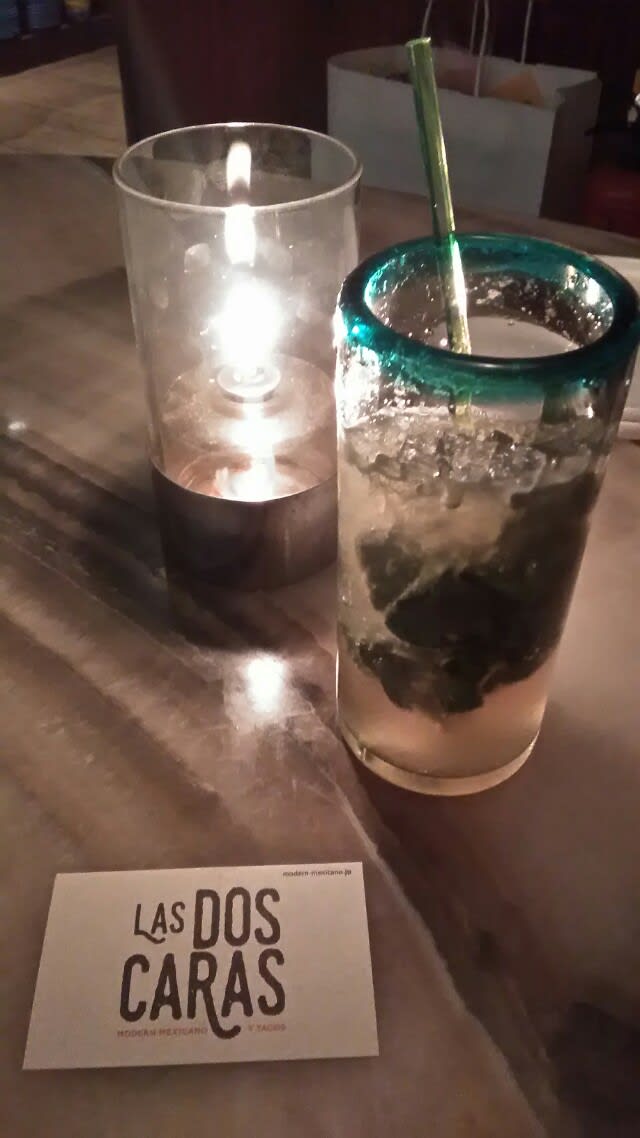
で、翌朝、地元の本屋さんで、パーヴォが表紙の「音楽の友」最新3月号を無事にゲット。
超~幸せ~
















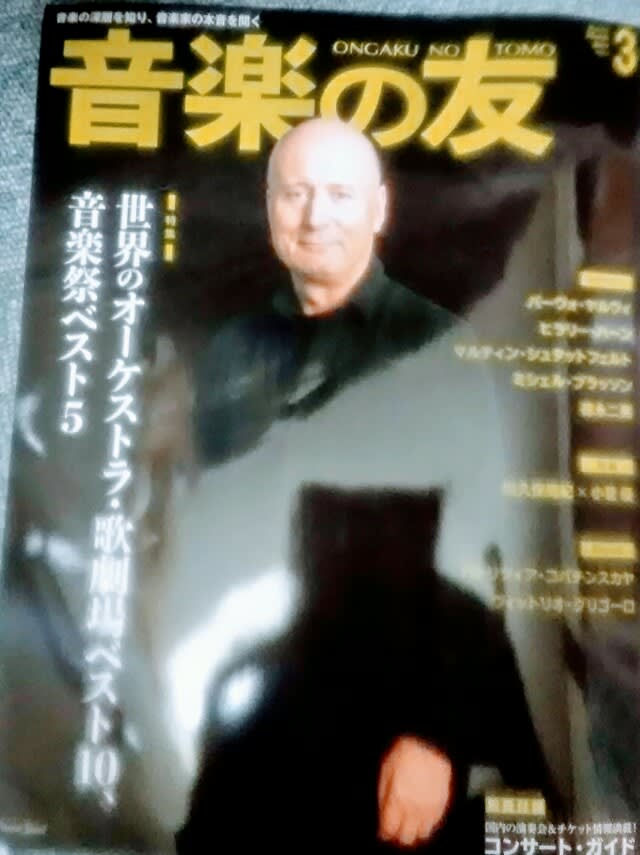
というわけで、表参道と原宿の休日は、めくるめく感動の中にすぎていったのでした・・
